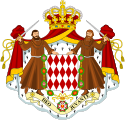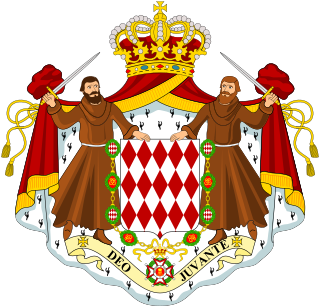 |
|---|
General election were held in Monaco on 21 May 1922 to elect 12 members of the National Council. The national councilmen were elected by a 30-member Electoral College.
 |
|---|
General election were held in Monaco on 21 May 1922 to elect 12 members of the National Council. The national councilmen were elected by a 30-member Electoral College.
The 30-member Electoral College consisted of nine members elected by the Communal Council and 21 members elected by voters. It also had substitute members elected by the Communal Council and six substitute members elected by voters.
The Communal Council held an election for nine members and three substitute members of the Electoral College on 29 April 1922, after a failed election on 25 March 1922. [1]
An election of the remaining 21 Electoral College members and six substitute members was held on 30 April 1922. [1] Only 20 candidates got a majority of votes to be elected.
| Candidates | Votes | |
|---|---|---|
| Members | Jean Bonafède | 407 |
| Louis Médecin | 335 | |
| Lazare Gastaud | 290 | |
| Fulbert Aureglia | 231 | |
| Clément Ciais | 228 | |
| François Devissi | 227 | |
| Étienne Vatrican | 226 | |
| Victor Bonafède | 226 | |
| Adolphe Blanchi | 224 | |
| Auguste Gastaud | 223 | |
| Henri Olivié | 223 | |
| Antoine Rapaire | 223 | |
| Joseph Raimbert | 221 | |
| Louis Rapaire | 221 | |
| Étienne Fautrier | 221 | |
| Ambroise Bonaventure | 220 | |
| Joseph Lorenzi | 220 | |
| François Fontana | 219 | |
| Jean Vatrican | 217 | |
| Antoine Icardi | 212 | |
| Étienne Ctovetto | 191 | |
| Henri Médecin | 187 | |
| Louis Bœuf | 185 | |
| Laurent Aureglia | 183 | |
| Eugène Marquet Jr. | 183 | |
| Henri Rapaire | 183 | |
| Charles Vatrican | 182 | |
| Jean Vatrican, d'Étienne | 182 | |
| Édouard Giordano | 181 | |
| Célestin Allavena | 180 | |
| Louis Settimo | 180 | |
| Jean Vatrican, entrepreneur | 179 | |
| Jules Crovetto | 177 | |
| Substitute members | Théodore Raimbert | 222 |
| Henri Bergeaud | 221 | |
| Pierre Campana | 221 | |
| Jean Bœuf | 220 | |
| François Scotto | 219 | |
| Jean Fontana | 218 | |
| Emmanuel Bœuf | 189 | |
| Louis Blanchy | 188 | |
| Joseph Boisson | 184 | |
| Marcel Médecin | 183 | |
| Jean Bocca | 178 | |
| Jules Baud | 177 | |
| Valid ballots | 416 | |
| Invalid ballots | 8 | |
| Total ballots | 424 | |
| Registered voters | 661 | |
| Source: [2] | ||
| Candidates | Votes | ||
|---|---|---|---|
| Louis Aureglia | 30 | ||
| Victor Bonafède Jr. | 30 | ||
| Jean Marsan | 28 | ||
| Paul Cioco | 27 | ||
| Henri Marquet | 27 | ||
| Joseph Crovetto | 26 | ||
| Alexandre Médecin | 25 | ||
| Michel Fontana | 24 | ||
| Eugène Marquet | 24 | ||
| François Devissi | 23 | ||
| Louis Bellando de Castro | 22 | ||
| Adolphe Olivié | 21 | ||
| André Notari | 12 | ||
| Étienne Fatitrier | 11 | ||
| Paul Bergeaud | 6 | ||
| Pierre Jioffredy | 5 | ||
| François Scotto | 2 | ||
| Source: [3] | |||

Since becoming independent of the United Kingdom in 1970, Fiji has had four constitutions, and the voting system has changed accordingly.

Elections in Venezuela are held at a national level for the President of Venezuela as head of state and head of government, and for a unicameral legislature. The President of Venezuela is elected for a six-year term by direct election plurality voting, and is eligible for re-election. The National Assembly (Asamblea Nacional) has 165 members (diputados), elected for five-year terms using a mixed-member majoritarian representation system. Elections also take place at state level and local level.
The elections in Taiwan each held every four years, typically in January and November. Since 2012 the previously eleven types of elections in Taiwan have been unified into general and local elections. There may also be by-elections. Electoral systems include first-past-the-post, proportional representation, single non-transferable voting, and a parallel mixture of the above.
In Ireland, direct elections by universal suffrage are used for the President, the ceremonial head of state; for Dáil Éireann, the house of representatives of the Oireachtas or parliament; for the European Parliament; and for local government. All elections use proportional representation by means of the single transferable vote (PR-STV) in constituencies returning three or more members, except that the presidential election and by-elections use the single-winner analogue of STV, elsewhere called instant-runoff voting or the alternative vote. Members of Seanad Éireann, the second house of the Oireachtas, are partly nominated, partly indirectly elected, and partly elected by graduates of particular universities.

Elections in Botswana take place within the framework of a multi-party democracy and a parliamentary system. The National Assembly is mostly directly elected, and in turn elects the President and some of its own members. The Ntlo ya Dikgosi is a mixture of appointed, hereditary and indirectly elected members.

Elections in Gabon take place within the framework of a presidential multi-party democracy with the Gabonese Democratic Party, in power since independence, as the dominant party. The President and National Assembly are directly elected, whilst the Senate is indirectly elected.
Elections in Luxembourg are held to determine the political composition of the representative institutions of the Grand Duchy of Luxembourg. Luxembourg is a liberal representative democracy, with universal suffrage guaranteed under its constitution. Elections are held regularly, and are considered to be fair and free.

Elections in Togo take place within the framework of a presidential system. Both the President and the National Assembly are directly elected by voters. Togo is a one party dominant state with the Union for the Republic in power.

National constituencies were a former feature of the Fijian electoral system. They were created as a compromise between demands for universal suffrage on a common voters' roll, and for a strictly communal franchise, with Parliamentary constituencies allocated on an ethnic basis and elected only by voters enrolled as members of specific ethnic groups.
National University of Ireland (NUI) is a university constituency in Ireland, which elects three senators to Seanad Éireann. Its electorate is the graduates of the university, which has a number of constituent universities. It previously elected members to the House of Commons of the United Kingdom (1918–1921), to the House of Commons of Southern Ireland (1921) and to Dáil Éireann (1918–1936).

Matete is one of the 24 communes that are the administrative divisions of Kinshasa, the capital city of the Democratic Republic of the Congo.

Senators in France are elected by indirect universal suffrage, by a panel of "electors". Half of the Senate seats are up for election every three years; the term of office is six years.
Parliamentary elections were held in the United Arab Emirates on 3 October 2015 to elect 20 of the 40 members of the Federal National Council. The elections took place through an electoral college, which was expanded from 129,274 members in the 2011 elections to 224,279 for the 2015 elections.

General elections were held in Monaco on 23 April 1911 to elect the 21 members of the National Council. A total of 20 candidates participated in the election. Out of the 629 registered voters, 524 voters cast their ballots.

General elections were held in Monaco on 19 May 1918 to elect the 12 members of the National Council. The national councilmen were elected by a 30-member Electoral College.

General election were held in Monaco on 16 June 1929 to elect the 12 members of the National Council. The national councilmen were elected by a 30-member Electoral College.

General elections were held in Monaco on 16 July 1933 to elect the 12 members of the National Council. The national councilmen were elected by a 30-member Electoral College.

General election were held in Monaco on 8 May 1921 to elect five members of the National Council. The national councilmen were elected by a 30-member Electoral College.

General election were held in Monaco on 18 April 1926 to elect 12 members of the National Council. The national councilmen were elected by a 30-member Electoral College.

General election were held in Monaco on 4 July 1937 to elect five members of the National Council. The national councilmen were elected by a 30-member Electoral College.